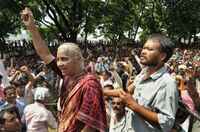Verdict and Recommendations: Case of Narmada Valley Madhya Pradesh and Maharashtra India
6 th SESSION OF THE INTERNATIONAL TRIBUNAL ON EVICTIONS (Venice, Italy, 28-30 September 2017)
Verdict and Recommendations: Case of Narmada Valley, Madhya Pradesh and Maharashtra, India*
Verdict
The 6th Session of the International Tribunal on Evictions was held on September 28th to 30th , 2017 at Venice in Italy. Along with the testimonies and depositions on various people’s struggles, they listened to the case of the Narmada Valley facing brutal eviction of more than 40,000 families in the name of Sardar Sarovar, a gigantic dam project. Even after 32 years long struggle, while the people’s right to rehabilitation before submergence as well as environmental protection to care the river and its ecosystem through mitigatory and compensatory measures were upheld by law, policies and judgments of the Apex Court in India, full and fair rehabilitation with justice is not yet received.
The Jury recognized the fact that the farmers, fish workers, labourers and traders in the plains of the state of Madhya Pradesh and hundreds of adivasis in Maharashtra, Madhya Pradesh and Gujarat are to face submergence of their houses, farms with highly fertile land, forests and tree cover; when the arrangements of rehabilitation at alternative sites with civic amenities are far from established. A few thousand families eligible for alternative land remain to receive either cultivable land or the court directed package of 15,00,000 to 60,00,000 rupees for purchasing land on their own. The Jury has received a large number of documents, seen photographs and realized the fact that massive evictions, planned and forced, are in violation of the Indian law, Narmada Water Dispute Tribunal Award, the judgements of 1992, 2000, 2005, 2017, directing ‘pari-passu’ rehabilitation with land for farmers and alternative livelihood for landless – ie other occupational categories including laborers, potters, fish workers, artisans, traders etc.
Such a massive displacement, especially of adivasis, without ensuring justice can’t be acceptable even for economic development. It is undoubtedly, the Jury asserts, against the UN Convention 107, adopted in 1957 at a Convention concerning the Protection and Integration of Indigenous and other Tribal and Semi-Tribal Populations in Independent Countries. India was one of the first countries to ratify ILO 107, on September 29, 1958. It is also noted that the International Covenant on Economic, Social and Cultural Rights too stands violated when the large number of communities, 244 villages and one township, are fully or partially affected and as per deposition with documents made before the Jury, about 30,000 and more families continue to live in the area yet to be affected, who cannot be considered as rehabilitated. They would face devastation and destitution if the directives issued by the apex court in 2017 that all oustees should vacate all the villages were followed.
The force used to try and evict thousands of families during monsoon 2017 was certainly an atrocity committed. False court cases filed against the affected women, men and activists as intimidation, the Jury holds to be unjust and undemocratic way of dealing with peaceful, non-violent struggle, and recommend an immediate withdrawal if those.
The case of Narmada-Sardar Sarovar has been an eye opener for the World Bank that had pushed the project ahead, without following the Indian law, the UN covenants or the Bank’s own manual. However, later in 1993, the Bank withdrew from the project based on the International Independent Review Commission’s Report. This led to and establishment an Inspection Panel within the World Bank, for all such oustees across the world. The Jury therefore, considers this case as an internationally acknowledged case of serious human rights violations.
Recommendations
The International Tribunal on Evictions has made specific recommendations in the present context, after more than 30 years of people’s struggle.
Those include prior and informed consent and consultations to be sought from the tribal communities on full and fair rehabilitation, as also the need for the Indian governments concerned to fulfill all obligations regarding social and environmental aspects of the Sardar Sarovar Project and the Narmada Valley Project (with 29 other big dams and 135 medium dams), before displacement of any family or community.
The Tribunal recommends that the gate of this giant dam should remain open till the legal mandate is fulfilled, keeping the river flow intact as much as possible.
The Tribunal takes cognizance of the need to make the Indian governments take to a serious dialogue with the people’s movement with strong mass support and expresses its willingness to play a role in mobilizing international support, involving UN agencies, if necessary, to protect the life and livelihood of such a huge population belonging to the oldest civilization in the world and the natural ecosystem in Narmada river valley.
Mechanism
ITE will initiate an International People’s Tribunal to visit the valley and make a full-fledged assessment before the submergence and forcible eviction that need to be prevented, at the earliest.
* Medha Patkar (09/04/2018, preliminary text EMBARGOED)

